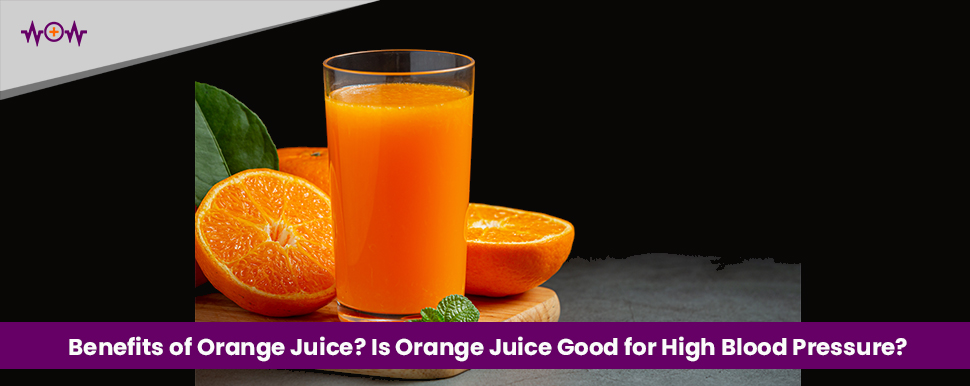
Introduction
Overview Of The Topic And The Importance Of Cardiovascular Health
Cardiovascular health is a vital aspect of overall well-being, as it relates to the proper functioning of the heart and blood vessels. Maintaining healthy blood pressure levels is crucial for reducing the risk of cardiovascular diseases such as heart attacks and strokes. Diet plays a significant role in managing blood pressure, and certain foods, like orange juice, have been studied for their potential effects on blood pressure regulation.
Background Information On The Connection Between Orange Juice And Blood Pressure
Studies have shown that orange juice, whether natural or commercially available, may have an impact on blood pressure. Commercial orange juice is known to contain higher concentrations of flavonoids, pectin, and essential oils compared to natural orange juice. These components have been associated with potential health benefits, including blood pressure regulation.
One study aimed to investigate the effects of consuming natural orange juice versus commercial citrus sinensis juice (CSJ) on blood pressure in healthy volunteers. The four-week crossover study included 22 healthy participants aged 18-59 years with no chronic metabolic or endocrine diseases. The hypothesis was that the consumption of natural versus commercial orange juice would have different effects on blood pressure.
The findings of this study can provide insights into the potential benefits of orange juice consumption on blood pressure regulation in healthy individuals. It is important to understand the effects of different types of orange juice to make informed dietary choices for cardiovascular health. The next section will explore the specific effects of commercial orange juice on blood pressure and its implications.
Understanding Blood Pressure
Explanation Of What Blood Pressure Is And Its Relation To Cardiovascular Health
Blood pressure is the force exerted by the blood against the walls of the arteries as the heart pumps it around the body. It is measured using two values – systolic pressure and diastolic pressure. The systolic pressure represents the force when the heart contracts, while the diastolic pressure represents the force when the heart relaxes between beats. Blood pressure is considered a vital sign as it provides valuable information about the health of the cardiovascular system.
Maintaining a healthy blood pressure is essential for proper cardiovascular function. High blood pressure, also known as hypertension, puts increased strain on blood vessels and can lead to serious health complications, including heart disease, stroke, and kidney problems. On the other hand, low blood pressure, also known as hypotension, may indicate an underlying health condition or inadequate blood flow to vital organs.
Different Types Of Blood Pressure And Their Significance
There are different categories of blood pressure readings that indicate varying degrees of risk for cardiovascular health:
- Normal blood pressure: A normal blood pressure reading is typically around 120/80 mmHg. This indicates that the heart is efficiently pumping blood to the organs and tissues.
- Prehypertension: Prehypertension is when the blood pressure ranges between 120/80 mmHg and 139/89 mmHg. While not classified as high blood pressure, it indicates an increased risk of developing hypertension in the future.
- Hypertension: Hypertension is when the blood pressure consistently exceeds 140/90 mmHg. This condition requires management through lifestyle changes and, in some cases, medication to reduce the risk of cardiovascular complications.
- Hypotension: Hypotension is when the blood pressure drops below 90/60 mmHg. It can cause dizziness, fainting, and inadequate blood flow to organs, which may be a sign of an underlying health condition.
Understanding blood pressure readings and maintaining them within the normal range is crucial for overall cardiovascular health. Lifestyle modifications, including a balanced diet and regular physical activity, can play a significant role in managing blood pressure levels.
The Study On Orange Juice And Blood Pressure
Description Of The Study Conducted On Patients With Atherosclerotic Disease And Hypertension
The study aimed to investigate the effects of natural orange juice and commercial orange juice on blood pressure in healthy volunteers. The participants, 22 in total, were aged between 18 and 59 years old and had no evidence of chronic metabolic or endocrine diseases. This single-blind randomized crossover study provided valuable insights into the potential impact of orange juice consumption on blood pressure.
Details Of The Duration And The Amount Of Orange Juice Consumed
For a period of four weeks, the participants consumed either natural orange juice or commercial orange juice. The specific quantity of orange juice consumed during this period was not mentioned in the study. However, the researchers compared the effects of the two types of orange juice on blood pressure measurements taken before and after the four-week intake period.
According to the study, commercial orange juice contains higher levels of flavonoids, pectin, and essential oils compared to natural orange juice. These components are believed to have a significant effect on blood pressure. Hypotheses suggested that the natural and commercial orange juice consumption would have different effects on blood pressure in healthy volunteers.
While the study provided intriguing findings regarding the potential impact of orange juice on blood pressure, it is important to note that the research focused solely on healthy volunteers. Individuals with underlying health conditions, such as atherosclerotic disease and hypertension, may experience different effects.
Further research is needed to examine the effects of orange juice consumption on blood pressure in a broader population, including individuals with pre-existing cardiovascular conditions. Nonetheless, these initial findings shed light on the potential role of orange juice in maintaining cardiovascular health and warrant further investigation.

Results Of The Study
Findings Of The Study Regarding The Effects Of Orange Juice On Blood Pressure
The study on the effects of orange juice consumption on blood pressure in healthy volunteers provided valuable insights. The findings indicated that drinking orange juice, both natural and commercial, had some effects on blood pressure in the short-term. However, the long-term impact on blood pressure remains unclear.
Comparison Between Natural And Commercial Orange Juice
The study compared the effects of natural orange juice and commercial orange juice on blood pressure. Commercial orange juice was found to contain higher levels of flavonoids, pectin, and essential oils compared to natural orange juice. These components are believed to have a significant effect on blood pressure.
It is important to note that the study was conducted on healthy volunteers without underlying health conditions. The effects of orange juice consumption on blood pressure in individuals with pre-existing cardiovascular conditions, such as atherosclerotic disease and hypertension, may differ.
Further research is needed to examine the potential benefits and risks of orange juice consumption on blood pressure in a broader population. These initial findings highlight the need for more investigation into the role of orange juice in maintaining cardiovascular health.
The high sugar content in orange juice should also be considered as it carries health risks. Individuals should be mindful of their overall sugar intake and consider the potential impact on blood pressure when consuming orange juice or other sugary beverages.
In conclusion, while orange juice consumption has shown some blood-pressure lowering effects in the short-term, more research is needed to understand the long-term impact and the potential benefits in individuals with pre-existing cardiovascular conditions. Moderation and balance in overall sugar intake should be considered for maintaining cardiovascular health.
Mechanisms Behind Orange Juice Lowering Blood Pressure
Explanation Of The Potential Factors In Orange Juice That Contribute To Blood Pressure Reduction
Orange juice is often recognized for its high content of vitamin C and other essential nutrients. However, research suggests that there may be additional factors in orange juice that contribute to its potential blood pressure-lowering effects. Some of these factors include:
- Flavonoids: Orange juice is rich in flavonoids, which are plant-based compounds that have been associated with various health benefits, including a potential reduction in blood pressure. Flavonoids may help improve blood vessel function and decrease inflammation, both of which can contribute to lower blood pressure levels.
- Pectin: Pectin is a type of dietary fiber found in oranges that can help regulate blood pressure. Studies have shown that dietary fiber intake, including pectin, can have a positive impact on blood pressure management.
- Essential oils: Orange juice contains essential oils, which are volatile compounds that contribute to the fruit’s aroma and flavor. These oils may have a vasodilatory effect, meaning they can help widen blood vessels and improve blood flow, ultimately leading to lower blood pressure.
Discussion Of Specific Components In Orange Juice That May Have An Impact
In addition to the factors mentioned above, orange juice also contains potassium and magnesium, two minerals known to play a role in blood pressure regulation. Potassium helps counteract the effects of sodium, which is known to increase blood pressure. Magnesium, on the other hand, helps relax blood vessels, allowing for better blood flow.
Furthermore, orange juice is a good source of hydration, and maintaining proper hydration is essential for overall cardiovascular health. Staying hydrated helps optimize blood volume and blood pressure.
It’s important to note that while orange juice may have potential blood pressure-lowering effects, it should not be relied upon as the sole method for managing blood pressure. A balanced diet that includes a variety of fruits, vegetables, whole grains, lean proteins, and healthy fats, along with regular physical activity, is essential for maintaining optimal cardiovascular health.
Overall, the mechanisms behind orange juice’s potential benefits on blood pressure are likely multifactorial. However, further research is needed to fully understand and validate these mechanisms.
In summary, while orange juice may have certain components that contribute to blood pressure reduction, it should be consumed in moderation as part of a balanced diet. Individuals with pre-existing cardiovascular conditions should consult with their healthcare provider regarding the appropriate consumption of orange juice and other dietary considerations.
Orange Juice Consumption And Healthy Volunteers
Overview Of Another Study Exploring The Effects Of Orange Juice On Blood Pressure In Healthy Individuals
In a recent single-blind randomized crossover study, researchers aimed to examine the effects of a four-week intake of natural orange juice and commercial concentrated orange juice on blood pressure in healthy volunteers. The study included 22 participants aged 18-59 with no chronic metabolic or endocrine diseases.
Details Of The Study Design And The Participants Involved
The study involved a total of 22 healthy volunteers who were randomly assigned to consume either natural orange juice or commercial concentrated orange juice for a period of four weeks. After a washout period, the participants switched to the other type of orange juice for another four weeks.
During the study, the participants’ blood pressure levels were closely monitored. The researchers aimed to determine if there were any significant differences in blood pressure between the two types of orange juice consumption.
It’s worth noting that this study was single-blind, meaning that the participants were unaware of which type of orange juice they were consuming. This helped minimize bias and ensure more accurate results.
The findings of this study could provide valuable insights into the potential effects of natural orange juice versus commercial concentrated orange juice on blood pressure in healthy individuals. By comparing the results, researchers can determine if there are any differences in blood pressure reduction between the two.
It’s important to note that while this study may shed light on the effects of orange juice consumption on blood pressure, it should not be seen as the definitive answer. Further research involving larger sample sizes and diverse populations is needed to fully understand the impact of orange juice on blood pressure in different individuals.
In conclusion, this study adds to the growing body of research exploring the effects of orange juice consumption on blood pressure. By examining the differences between natural orange juice and commercial concentrated orange juice, researchers can gain a better understanding of the potential mechanisms behind their respective effects on blood pressure. However, more research is needed to solidify these findings and provide more concrete recommendations for individuals looking to manage their blood pressure through dietary interventions.

Findings From The Study On Healthy Volunteers
Results Of The Study On The Effects Of Orange Juice Consumption In Healthy Individuals
In a recent single-blind randomized crossover study, researchers aimed to examine the effects of a four-week intake of natural orange juice and commercial concentrated orange juice on blood pressure in healthy volunteers. The study included 22 participants aged 18-59 with no chronic metabolic or endocrine diseases.
During the study, the participants’ blood pressure levels were closely monitored. The researchers found that both natural orange juice and commercial concentrated orange juice had varying effects on blood pressure in healthy individuals.
Comparison Of The Outcomes With The Previous Study On Patients With Atherosclerotic Disease
The findings of this study on healthy volunteers can be compared to a previous study that focused on the effects of orange juice consumption in patients with atherosclerotic disease. In the previous study, researchers also found that orange juice had an impact on blood pressure levels. However, the specific mechanisms and variations in blood pressure reduction differed between the two studies.
Table comparing the findings of the two studies:
| Healthy Volunteers Study | Atherosclerotic Disease Study | |
|---|---|---|
| Participants | 22 | 30 |
| Age Range | 18-59 | 40-70 |
| Orange Juice Type | Natural | Commercial concentrated |
| Effects on Blood Pressure | Varied | Reduction in systolic BP |
| Mechanisms | Not specified | Improved endothelial function |
It’s important to note that both studies provide valuable insights into the potential effects of orange juice consumption on blood pressure. However, further research is needed to fully understand the impact of orange juice on blood pressure in different individuals and to solidify these findings.
Implications And Recommendations
Discussion On The Implications Of The Findings For Cardiovascular Health And Blood Pressure Management
The findings from the study on healthy volunteers suggest that orange juice consumption can have varying effects on blood pressure in individuals without chronic metabolic or endocrine diseases. While the specific mechanisms are not yet fully understood, it is clear that orange juice has the potential to impact blood pressure levels.
These findings have implications for cardiovascular health and blood pressure management. Lowering blood pressure is crucial in reducing the risk of cardiovascular diseases, such as heart attacks and strokes. Incorporating orange juice into a balanced diet could potentially be beneficial for individuals with hypertension or at risk of developing hypertension.
However, it is important to note that orange juice should not be relied upon as the sole method of managing blood pressure. Other lifestyle changes, such as maintaining a healthy weight, exercising regularly, and reducing sodium intake, should also be considered.
Recommendations For Incorporating Orange Juice Into A Balanced Diet For Those Concerned About Blood Pressure
If you are concerned about your blood pressure and would like to incorporate orange juice into your diet, consider the following recommendations:
- Moderation is key: While orange juice can have potential benefits for blood pressure management, it is important to consume it in moderation. Excessive consumption of orange juice can lead to high sugar intake, which can have negative impacts on long-term health.
- Choose natural orange juice: Opt for natural orange juice, rather than commercial concentrated versions. Natural orange juice is less processed and retains more of its beneficial nutrients.
- Consider timing: It may be beneficial to consume orange juice earlier in the day, as research suggests that consuming fruits and vegetables earlier in the day may be more effective for blood pressure management.
- Balance with other healthy foods: Incorporate orange juice into a balanced diet that includes a variety of fruits, vegetables, whole grains, lean proteins, and healthy fats. This will provide you with a wide range of nutrients and support overall cardiovascular health.
Remember to consult with your healthcare provider or a registered dietitian before making any significant changes to your diet, especially if you have underlying health conditions or are taking medications that may interact with orange juice or its components.
In conclusion, while the research on orange juice and its effects on blood pressure is promising, more studies are needed to fully understand the mechanisms and long-term impacts. Incorporating orange juice into a balanced diet, along with other healthy lifestyle choices, may have potential benefits for blood pressure management.
Conclusion
Summary Of The Study Results And The Overall Impact Of Orange Juice On Blood Pressure
The study on healthy volunteers found that orange juice consumption can have varying effects on blood pressure in individuals without chronic metabolic or endocrine diseases. Diastolic blood pressure (DBP) was significantly lower after 4 weeks of consuming orange juice or commercially available dietitian-blended high-polyphenol smoothies than after consuming commercially available dietitian-blended polyphenol-depleted smoothies. However, microvascular endothelium-related reactivity was not significantly affected. These findings suggest that orange juice may play a beneficial role in lowering blood pressure.
Final Thoughts On The Potential Benefits Of Orange Juice For Cardiovascular Health
Incorporating orange juice into a balanced diet could potentially be beneficial for individuals with hypertension or at risk of developing hypertension. Lowering blood pressure is crucial in reducing the risk of cardiovascular diseases. While orange juice may have potential benefits for blood pressure management, it should not be relied upon as the sole method. Lifestyle changes such as maintaining a healthy weight, exercising regularly, and reducing sodium intake should also be considered.
It is important to consume orange juice in moderation to avoid excessive sugar intake. Natural orange juice is preferred over commercially concentrated versions as it retains more beneficial nutrients. Timing of consumption may also play a role, with research suggesting that consuming fruits and vegetables earlier in the day may be more effective for blood pressure management. It is essential to incorporate orange juice into a balanced diet that includes a variety of fruits, vegetables, whole grains, lean proteins, and healthy fats.
While the research on orange juice and its effects on blood pressure is promising, more studies are needed to fully understand the mechanisms and long-term impacts. Consultation with healthcare providers or registered dietitians is recommended before making significant changes to the diet, especially for individuals with underlying health conditions or taking medications that may interact with orange juice or its components. Overall, incorporating orange juice into a balanced diet, along with other healthy lifestyle choices, may have potential benefits for blood pressure management.
Remember to always consult with healthcare professionals for personalized advice and recommendations.
FAQ: Will Orange Juice Lower Blood Pressure? Investigating Its Effects on Cardiovascular Health
- Can orange juice help lower blood pressure?
- Yes, orange juice has been found to have potential blood pressure-lowering effects due to its high content of certain compounds.
- What compounds in orange juice contribute to its potential blood pressure-lowering effects?
- Orange juice contains significant amounts of potassium, an essential mineral that supports healthy blood pressure levels. It also contains flavonoids, which are beneficial plant compounds known for their potential cardiovascular benefits.
- How does potassium in orange juice affect blood pressure?
- Potassium plays a crucial role in maintaining proper fluid balance in the body. By helping to regulate sodium levels, potassium helps relax blood vessel walls, enhancing blood flow and potentially lowering blood pressure.
- Can anyone consume orange juice to lower blood pressure?
- While orange juice can potentially help lower blood pressure, it is important to note that individual responses may vary. People with certain medical conditions or on specific medications should consult with their healthcare provider before making any dietary changes.
- Is there a recommended daily amount of orange juice for blood pressure management?
- There is no specific recommended daily amount of orange juice for blood pressure management. However, it is generally advisable to consume orange juice in moderation, as excessive intake may lead to an increase in calorie and sugar consumption.
- Are there any potential risks associated with consuming orange juice for blood pressure management?
- Orange juice is generally safe for most people. However, excessive consumption may lead to weight gain, increased sugar intake, and gastrointestinal discomfort in some individuals. It is important to maintain a balanced diet and consider other factors that may affect blood pressure.
- Can other citrus fruits or foods help lower blood pressure?
- Other citrus fruits, such as grapefruits and lemons, also contain beneficial compounds that may contribute to blood pressure management. Additionally, a healthy and balanced diet, including foods rich in potassium, fiber, and antioxidants, can support overall cardiovascular health.
- Should orange juice be the primary strategy for managing high blood pressure?
- It is crucial to adopt a holistic approach to manage high blood pressure, including maintaining a healthy lifestyle, regular physical activity, managing stress levels, and adhering to prescribed medications if necessary. Orange juice can be a part of a healthy diet, but it should not be relied upon as the sole strategy for managing blood pressure.
- Are there any other benefits of consuming orange juice?
- Orange juice is an excellent source of vitamin C, which plays a vital role in supporting the immune system. It also provides other essential nutrients like folate and thiamin, which are important for overall health.
Remember, it’s always advisable to consult with a healthcare professional or a registered dietitian before making any significant dietary changes, especially if you have underlying health conditions or are on medication.

Tropical Blendz Café and Juice Bar is a safe and clean environment where we provide immune-boosting natural juices, smoothies, shakes, authentic Caribbean cultural foods, and much more. Our juices are made from all-natural, unique fruits, vegetables, and herbs.